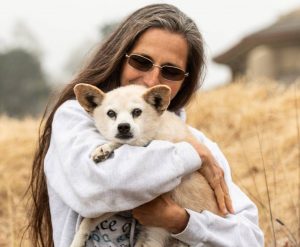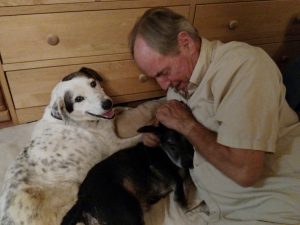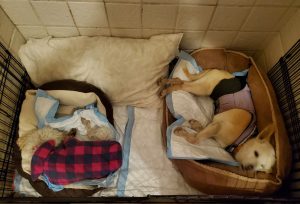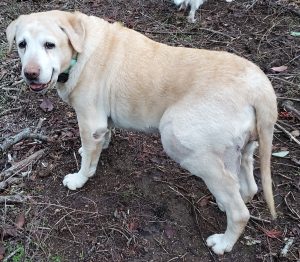Taking On the Challenges of Foster/Hospice Care for “Super Seniors”

Lynn Overtree and her husband, Tony Canavarro, are long-time foster volunteers for Peace of Mind Dog Rescue in Pacific Grove, CA. Lynn began fostering dogs when she was in college at Humboldt State University in Arcata, CA. (Currently, she is a land conservation manager working for land trusts in the Monterey Bay area.) In the 1980’s, Tony worked as a paramedic, a background that has come in very handy since they’ve been offering foster/hospice care for senior dogs.

Senior dog rescue agencies like Peace of Mind — given their mission — inevitably must take in old dogs with diseases and conditions that present extraordinary challenges. Referred to as “Super Seniors,” these dogs may be afflicted with some or all of these: cognitive decline, blindness, hearing loss, incontinence, serious mobility issues, and various terminal illnesses such as cancer. Super Seniors are offered only to experienced foster volunteers like Lynn and Tony, who, over the past several years, have been specializing in Super Seniors.
How do Lynn and Tony meet the challenges of caring for Super Seniors? Certainly, with their incredibly positive attitudes. Lynn says, “We get so much out of doing all we can to help these dogs, and we learn a great deal from them.” Tony says, “These dogs go through so much and just take all of it in stride – they’re an inspiration to me.”

On the practical front, their home environment is set up to deal with one of the most common conditions in old dogs — incontinence. All the dog beds are outfitted with a large trash bag that encases and protects the interior mattress; all other components of the bed are washable. At nighttime, a special sleeping arrangement is set up in an enclosed bathroom shower, which prevents potentially dangerous wanderings. “X-pens” are used to create safe areas where a dog can move about or rest comfortably during the day and at the same time be protected. “Help ‘Em Up” harnesses and 4-wheeled carts serve to assist mobility-challenged dogs in standing upright for a bit through the day.
Other equipment also comes in handy, such as a “baster,” which can be used to introduce small amounts of water or food into the mouth of a dog who is unable to drink or eat from a bowl. Lynn says that, even when a dog seems to lose interest completely in eating or drinking, a little encouragement with the baster can turn things around.
There are many other “tricks” they’ve learned over the years to keep their foster Super Seniors super comfortable and to give them the best possible quality of life until the very end. Lynn says, “Sure, mistakes happen; but you keep learning and doing the best you can.”

Currently in residence with Lynn and Tony, is “Doja Marie,” an 11-year-old Yellow Lab who has three types of cancer, one of which is in remission. She is their 46th foster dog, and a really great one, Lynn says.
What happens when these Super Seniors leave their hospice home to “go on ahead”? A sense of loss and sorrow is definitely part of the experience. But there’s always another Super Senior waiting in the wings for the love and care Lynn and Tony are unfailingly willing to give in order to make a senior dog’s remaining days the best they can possibly be.
